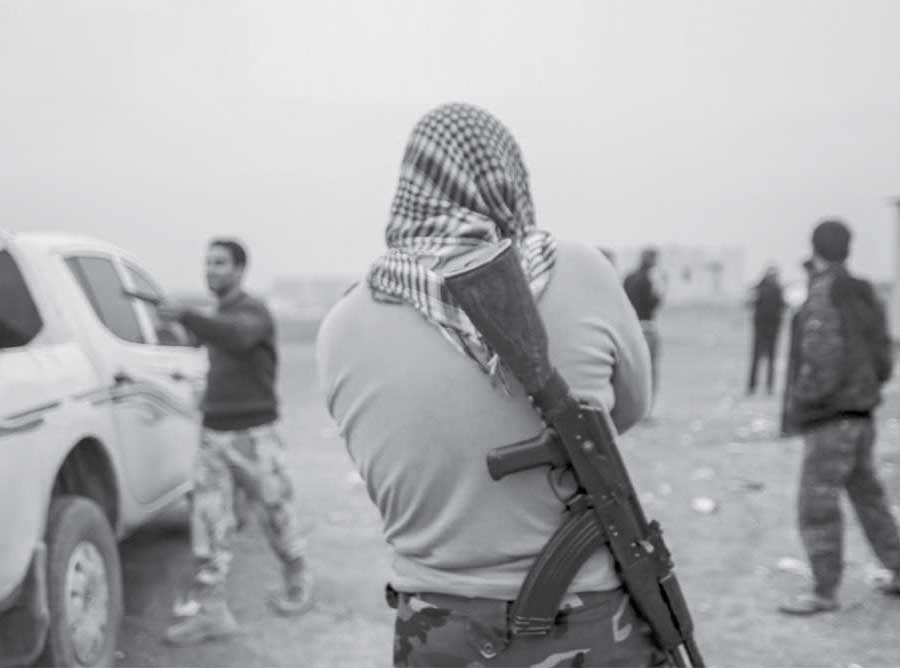The ISIS Crisis
The Plan to Defeat Radicalism

At an interfaith conference in Geneva, the Saudi head of the Muslim World League privately acknowledged that he perceived Christians as infidels because they believe that Jesus is the son of God, and believe in the Trinity and in the divinity of Jesus. After a 15-minute presentation summarizing groundbreaking new research—demonstrating that we are actually not so far apart on these historically inflammatory issues—he leapt to his feet and stated, “If what you say is true, it would change the world!”
In response to this same approach, the President of Sudan reversed his position and deployed UN peacekeepers in war-ravaged Darfur. These are but two of many examples of the impact of powerful new paradigms—rooted in extensive linguistic research—on real-world peacemaking and crisis management.1
More than 20 years ago, founders of Bridges to Common Ground (“Bridges”) discovered scholarly evidence embedded within the Semitic texts of the three Abrahamic holy books that render impotent the primary religious dogmas used to target the “other” as “infidel” and hence, “worthy of death.” Once seeing the true meaning of key words in the “holy books,” many adherents begin to immediately experience a rewiring of their thinking.
How many Christians, for example—or even Muslims— know that Jesus is mentioned in the Qur’an as Messiah, Word of God, Spirit of God, supernaturally conceived, able to heal the sick and raise the dead, and taken up to heaven to be near to God and presiding on Judgment Day? These references do not occur occasionally, but 100 times. This new realm of understanding helps to establish substantial common ground on spiritual issues heretofore considered forbidden, heretical and impossible to bridge. It supplements traditional diplomatic, political, economic and military tracks of conflict resolution with one using spiritual principles that remodel the radical mindset.
Western governments are desperate to find a solution to ISIS. However, governments around the world have failed to develop or employ an effective, comprehensive strategy against radicalized and militant Islam. A fatal flaw in current strategy is that policy makers have no idea how to deal with the spiritual/religious dimension of these conflicts, and thus tend to leave it unaddressed.
There may be some small measure of recent progress pushing back ISIS, but as CIA Director, John Brennan, affirmed, “We cannot kill our way out” and must, “address underlying factors and conditions [causing radicalism].” ISIS is currently filling the perceived needs of its recruits: a desire for revenge and significance—using “religion” by distorting it to a violent and merciless end. These atrocities, along with a basic misunderstanding of the nature of Islam, have sparked fear and antipathy in the West.
No matter how well-trained our armies, how advanced our technology or how massive our budget, no amount of violence alone can bring resolution. Violence on our part—however, we justify it—serves to intensify the long- term crisis, creating yet another generation of willing martyrs avenging the deaths of family, friends, and loved ones.
term crisis, creating yet another generation of willing martyrs avenging the deaths of family, friends, and loved ones.
What option is left but to declare a new kind of war, a war on radicalism itself ? The kind of war we outline here offers an alternative path. It too uses “religion,” but does so redemptively and restoratively. For many years,
Bridges has witnessed the effectiveness of this approach around the world, undermining the driving pseudo- Islamic ideology that underpins the radical movement. Truly defeating ISIS and radicalism will require a multifaceted, holistic and long-term approach.
RADICALISM, NEUROSCIENCE, LINGUISTICS AND PROPHETIC HOPE
Defeating ISIS, and radicalism itself, will require a creative blend of science and spirituality. Both yield insights into psychosocial factors often ignored when dealing with these kinds of conflicts. This is especially critical among the youth that constitute over half of the Arab population.
A growing body of data provides the profile of a typical radical.2 Recruits are not especially poor, uneducated or mentally unstable. However, many young Muslims are disillusioned that democratization will deliver them from ruthless regimes. They are frustrated with the failure and corruption of institutions. In desperation, they turn to groups like ISIS who use Islam, offering candidates the illusion of fighting Satan near the “end of days,” and martyrdom as the assurance of eternal life.
Believers know the power of the Holy Spirit can rewire the human brain—from hate to mercy and compassion. The science of neuroplasticity refers to the brain’s ability to rewire neuropathways. Parts of the brain responsible for radicalism are not set in stone; these impulses can be weakened.
Christians authentically exemplifying the Greatest Commandment can play a key role in this. By exchanging animosity toward Muslims for Spirit-inspired love, Christians actually become more effective participants in the real battle, which is spiritual.
Prophesy is a driving factor in shaping the worldview of many Western Christians, who view the establishment of the state of Israel as miraculous history unfolding. Less-understood prophecies such as Isaiah 19:20-25 speak of a spiritual awakening sweeping the Arab world, ushering in a time of renewal for the Abrahamic faiths. Careful analysis of key Hebrew words indicates all three will worship, call on and be a blessing to the same God! 3
How could this happen? Isaiah 59:19 describes a move of the “Spirit” that will “put to flight” the evil flood—an apt description of the rising tide of radicalism exemplified by ISIS and Boko Haram. This verse includes a “God revering and awe-inspired West” that should stir hope and prompt courageous action on the part of Christians to figure out how to apply love (friendship), compassion and mercy in place of fear, rather than one-dimensional calls for expanded military solutions.3 Muslims also resonate with the prophetic “end of days” scenario while radicals distort it to attract recruits. Indeed, God has awakened his spiritual “force.”
THREE AWAKENINGS
Islamist radicalism is at a point similar to where the Christian church was in the 17th century: plagued by a devastating 30-year war; engaged in inquisitions, pogroms, burning witches at the stake; drawing and quartering “heretics” simply for reading the Bible; and martyring Anabaptists for their nonviolent views. It took widespread dissatisfaction with the status quo to birth the awakenings that eventually lifted the Christian faith out of barbarism.
Of the awakenings currently sweeping the globe, three in particular are impacting Islam. Christians would do well to catch up with what God is already doing, and become a vital part of a hope-led solution, not a chronic part of expanding a fear-based problem!
FIRST AWAKENING: CHALLENGING THE STATUS QUO
The Arab Spring reflects a new willingness to challenge authority in many every contexts, including political and economic. Growing demands for political and social justice reflect a much broader rethinking of the status quo. But the search for political justice remains elusive, predisposing many toward a more profound and effective 2nd awakening.
SECOND AWAKENING: MASS RETHINKING OF ISLAM
The 2nd awakening expresses dissatisfaction with the extraordinary bloodlust of ISIS and other radicals who claim their actions are “Islamic.” The Arabic term for this awakening is ijtihad. It involves rethinking and reinterpretation of the Qur’an and its application in the modern context. The disgusting brutality of Islamist radicalism is prompting record numbers of Muslims to search for a fresh and more complete understanding of their faith. Amazingly, disenchanted ISIS fighters are seeking refuge by the hundreds.4 They are prime candidates for ijtihad, which offers alternative reformist religious constructs.
Since 9/11, Christians have called on Muslims to renounce radical interpretations of the Qur’an, and related terrorist actions. Similarly, Egyptian President al-Sisi has said: “I see that the religious discourse in the entire Islamic world has cost Islam its humanity...and desperately needs a religious revolution.” 5 Numerous Muslim leaders now echo President al-Sisi’s call for reassessment. These include Professor Dr. Sheikh Ahmad Muhammad al-Tayyeb, the Grand Imam of Al- Azhar University; Ahmed Aboutaleb, the Muslim Mayor of Rotterdam; and Dr. Radwan Masmoudi, the Founding President of the Center for the Study of Islam and Democracy (CSID).
More than ever in its 1400-year history, Islam is on the verge of an awakening that incorporates a new tafsir (Arabic for “interpretation”) of the Qur’an. Clarification of the precepts of Islam is creating an unprecedented openness to new ways of thinking. This should incentivize all concerned parties, especially Christians, to support any effort that seeks peaceful resolution of the current state of perpetual conflict. Western Christians’ expressions of love and compassion can help tip the balance toward those pursuing more accurate interpretation of the “holy books” and into the 3rd awakening.
THIRD SPIRITUAL AWAKENING: HOPE IN THE MESSIAH
The 3rd awakening is a spiritual revolution toward Jesus and his teachings among Muslims, Christians and Jews. Untold numbers are dreaming dreams and seeing visions of Jesus the Messiah, and millions are awakening to an enlightened spiritual path.6 The disenfranchised are seeking freedom, and finding that “where the Spirit of the Lord is there is (true) freedom.”
For Muslims this involves emphasizing what Jesus taught about love, mercy and compassion. The word Jesus frequently used for “love” in the Aramaic Gospels is the Arabic cognate for “compassion and mercy,” which appears in every chapter (but one) in the Qur’an, and is recited in every Muslim prayer. These revelations are Spirit-driven, rooted in a fresh understanding of Jesus the Messiah, directly undermining the factors that make ISIS, and radicalism in general, such a relentless foe.
This understanding offers a different paradigm for those devoted to Islam. Instead of elevating war and violent death as the way to heaven, it provides a nonviolent, noble path to Paradise for eternity. It also supports the growing redefinition of Islam, more in keeping with its actual meaning: peace and submission to God.
Christians can help by embracing these awakenings, and responding with some rethinking of their own. Muslims are not the enemy. Radicalism is the enemy. Professor Samuel Huntington stated that East and West are facing a “clash of civilizations,” but author Tim Timmons argues we are really facing a “clash of the kingdoms of good & evil. It is not Islam; it is evil that we stand against!”
Jesus’ command to love extends to every Christian’s Muslim “neighbor.” By changing from adversaries to partners in Islam’s struggle for reform, Christians can directly affect the outcome of these movements. This begins with courageous, visionary leaders exchanging fear of Muslims with the call for love and reconciliation.
At a more personal level, building on new linguistic discoveries about what we have in common opens the door for friendship, which in turn creates new realms of opportunity. From this point of departure, incredible breakthroughs in peace and reconciliation are possible.
Without Jesus’ followers ever lifting a sword, the Roman Empire ultimately adopted the very path they set out to annihilate. How did this happen? It was by the power of courageous faith in the face of ultimate terror. Over time, this Way transformed the minds and hearts of those possessed with hatred and blood-lust.
Is ISIS more powerful than the 4th century Roman Empire? Is it so unthinkable that it could happen again?









comments